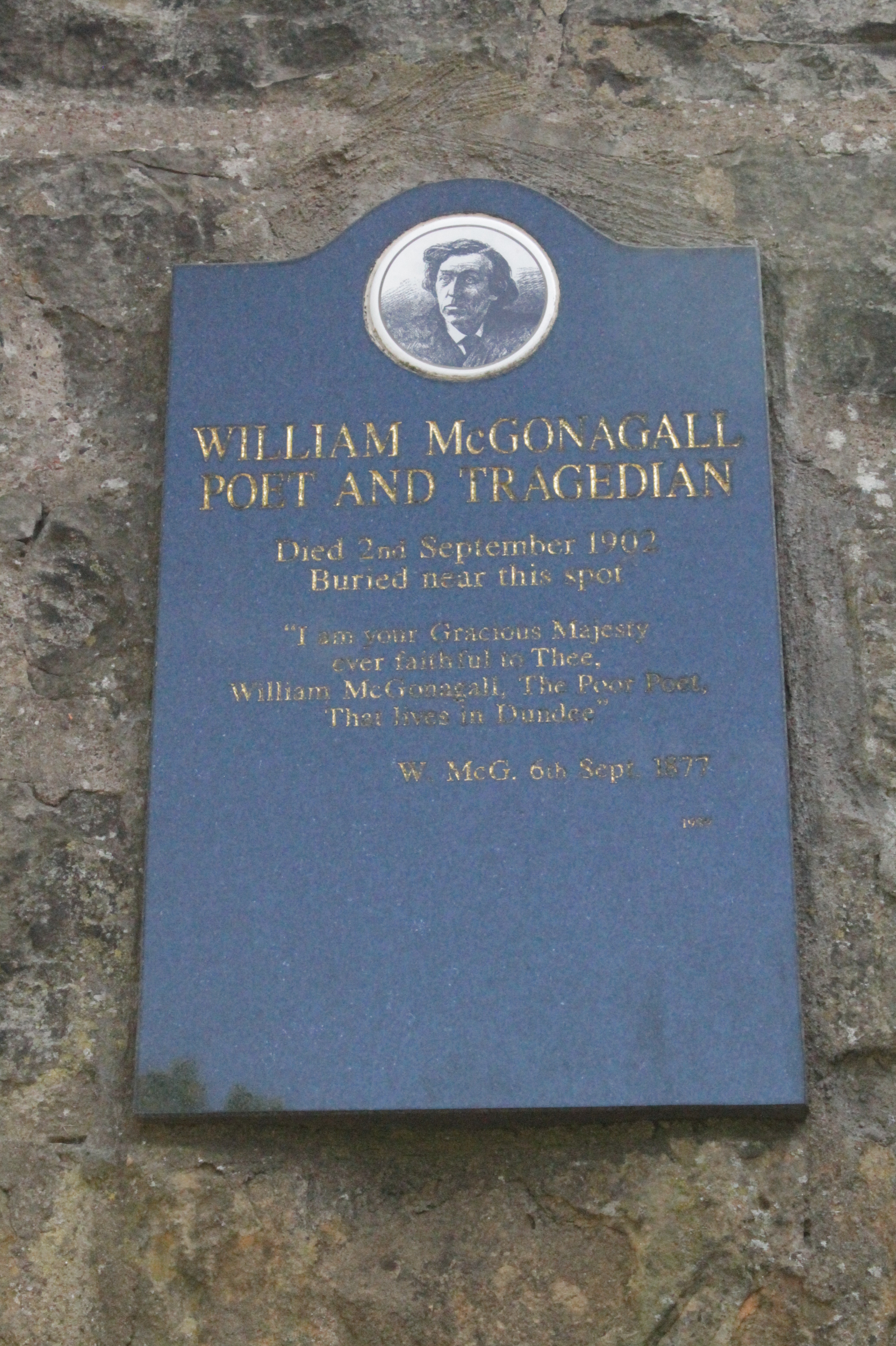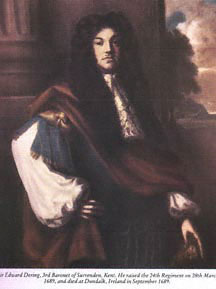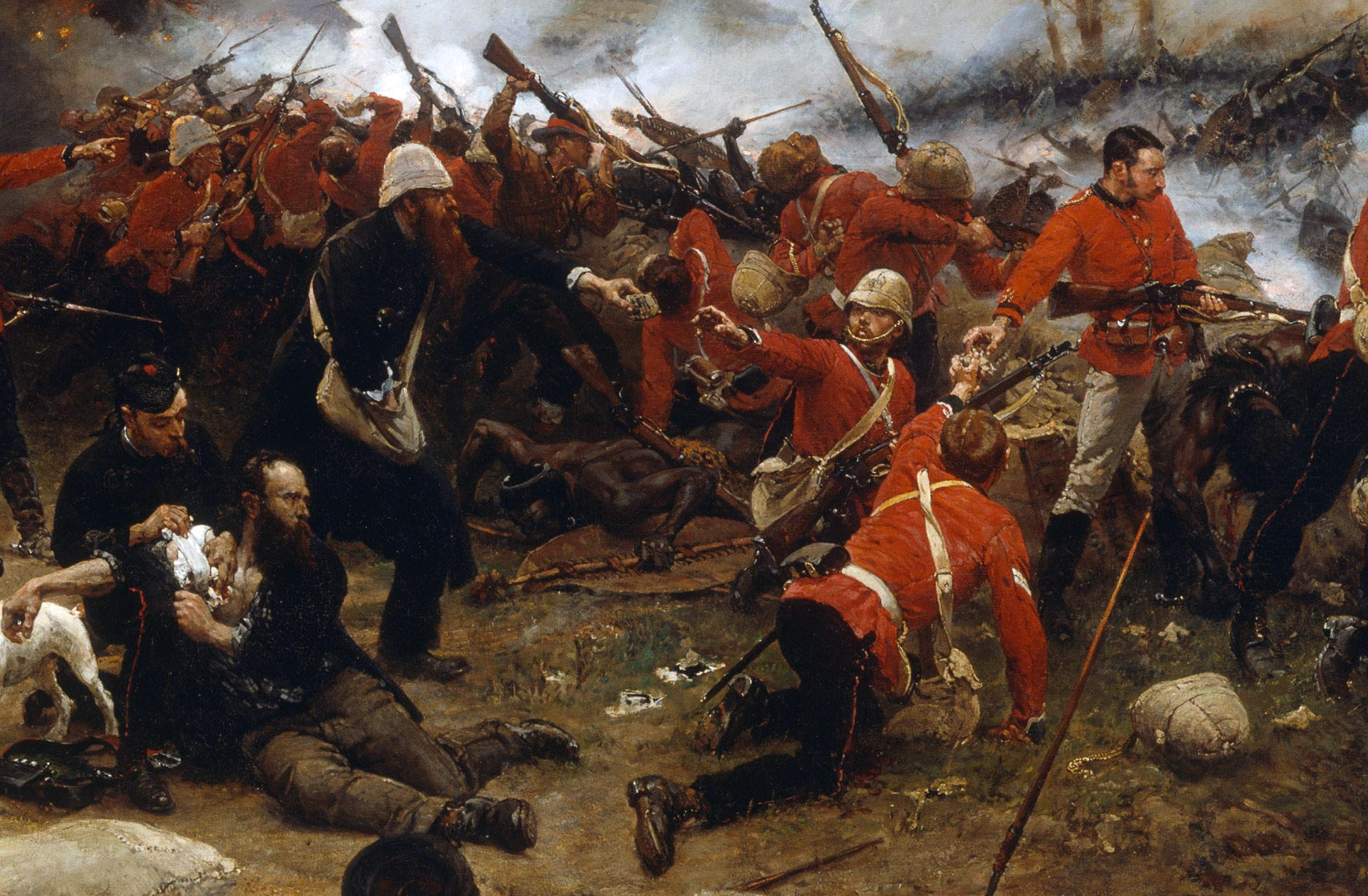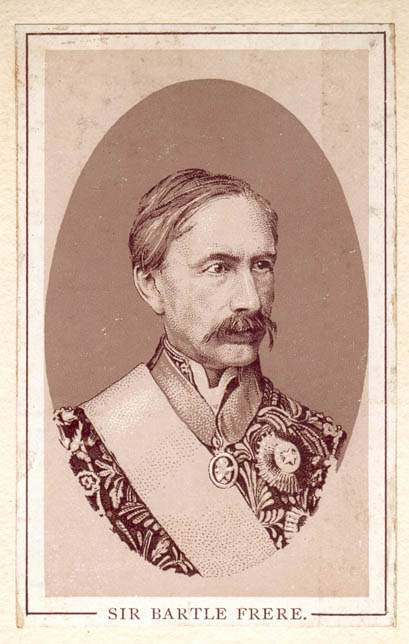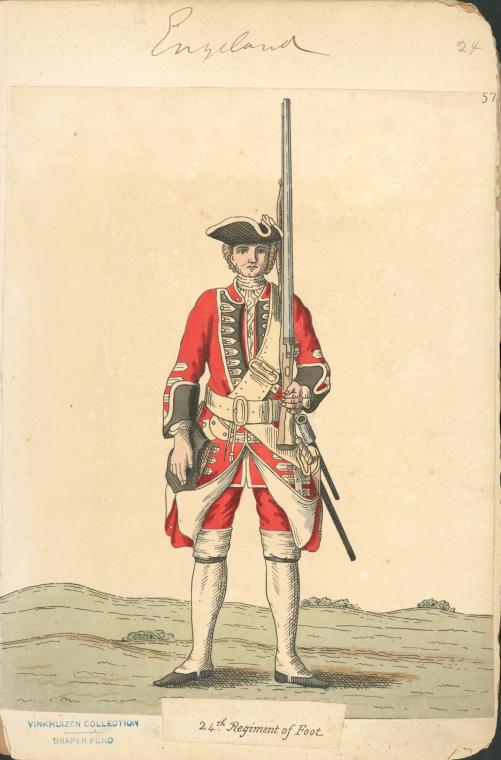|
Henry Hook (VC)
Alfred Henry "Harry" Hook VC (6 August 1850 – 12 March 1905) was an English recipient of the Victoria Cross, the highest and most prestigious award for valour in the face of the enemy that can be awarded to British and Commonwealth forces, for his actions at the Battle of Rorke's Drift. Background Born in Churcham, Gloucestershire, Hook originally served in the Monmouth Militia for five years before enlisting in the regular army in March 1877, aged 26. Previously serving in the 9th Xhosa War in 1877, he received a scalp injury during the battle of Rorke's Drift, and retired from the regular army 17 months later in June 1880, but later served 20 years in 1st Volunteer Battalion, Royal Fusiliers, reaching the rank of sergeant-instructor. He received his VC from Sir Garnet Wolseley, GOC South Africa at Rorke's Drift on 3 August 1879. After his 1880 discharge he was found the position of inside duster at the British Museum thanks to the intervention of Gonville Bromhead, Lord Ch ... [...More Info...] [...Related Items...] OR: [Wikipedia] [Google] [Baidu] |
Churcham
Churcham is a small village and civil parish in the Forest of Dean District of Gloucestershire in England, located west of Gloucester. It has a population of 655. Retrieved 20 January 2010 ''Churcham Primary School'', is a small school with 59 pupils in two classes. The village was formerly the home of |
Gonville Bromhead
Major Gonville Bromhead VC (29 August 1845 – 9 February 1891) was a British Army officer and recipient of the Victoria Cross, the highest award for valour in the face of the enemy that can be awarded to members of the British armed forces. He received the medal for his part in the defence of Rorke's Drift in January 1879, in which a small British garrison of 139 soldiers successfully repulsed an assault by some 4,000 Zulu warriors. Bromhead was portrayed by Michael Caine in the film '' Zulu'', which depicted the battle. Born into a notable military family, Bromhead was brought up in Thurlby, Lincolnshire. He entered the 24th Regiment of Foot as an ensign in 1867 and was promoted to lieutenant in 1871. Bromhead's battalion was deployed to southern Africa in 1878 and subsequently served in the Ninth Cape Frontier War and the Anglo-Zulu War. He spent most of the remainder of his career in south Asia, where he was promoted to major in 1883 and saw service in the Third Anglo-B ... [...More Info...] [...Related Items...] OR: [Wikipedia] [Google] [Baidu] |
Zulu (1964 Film)
''Zulu'' is a 1964 British epic war film depicting the Battle of Rorke's Drift between the British Army and the Zulus in January 1879, during the Anglo-Zulu War. It shows how 150 British soldiers, 30 of whom were sick and wounded patients in a field hospital, successfully held off a force of 4,000 Zulu warriors. The film was directed by American screenwriter Cy Endfield and produced by Stanley Baker and Endfield, with Joseph E. Levine as executive producer. The screenplay was by Endfield and historical writer John Prebble, based on Prebble's 1958 '' Lilliput'' article "Slaughter in the Sun". The film stars Baker and introduces Michael Caine, in his first major role, with a supporting cast that includes Jack Hawkins, Ulla Jacobsson, James Booth, Nigel Green, Paul Daneman, Glynn Edwards, Ivor Emmanuel, and Patrick Magee. Zulu chief and future South African political leader Mangosuthu Buthelezi played Zulu King Cetshwayo kaMpande, his great-grandfather. The opening and closing nar ... [...More Info...] [...Related Items...] OR: [Wikipedia] [Google] [Baidu] |
William McGonagall
William Topaz McGonagall (March 1825 – 29 September 1902) was a Scottish poet of Irish descent. He gained notoriety as an extremely bad poet who exhibited no recognition of, or concern for, his peers' opinions of his work. He wrote about 200 poems, including "The Tay Bridge Disaster" and "The Famous Tay Whale", which are widely regarded as some of the worst in English literature. Groups throughout Scotland engaged him to make recitations from his work, and contemporary descriptions of these performances indicate that many listeners were appreciating McGonagall's skill as a comic music hall character. Collections of his verse remain popular, with several volumes available today. McGonagall has been lampooned as the worst poet in British history. The chief criticisms are that he was deaf to poetic metaphor and unable to scan correctly. His only apparent understanding of poetry was his belief that it needed to rhyme. McGonagall's fame stems from the humorous effects these shor ... [...More Info...] [...Related Items...] OR: [Wikipedia] [Google] [Baidu] |
South Wales Borderers
The South Wales Borderers was a line infantry regiment of the British Army in existence for 280 years. It came into existence in England in 1689, as Sir Edward Dering's Regiment of Foot, and afterwards had a variety of names and headquarters. In 1782, it became the 24th Regiment of Foot, and had its depot in Warwickshire. Based at Brecon from 1873, the regiment recruited from the border counties of Brecknockshire, Monmouthshire, and Herefordshire. It was not called the South Wales Borderers until the Childers Reforms of 1881. The regiment served in a great many conflicts, including the American War of Independence, various conflicts in India, the Zulu War, Second Boer War, and World War I and World War II. In 1969 the regiment was amalgamated with the Welch Regiment to form the Royal Regiment of Wales. History Early history The regiment was formed by Sir Edward Dering, 3rd Baronet as Sir Edward Dering's Regiment of Foot in 1689, becoming known, like other regiments, by the ... [...More Info...] [...Related Items...] OR: [Wikipedia] [Google] [Baidu] |
John Williams (VC)
John Williams (born John Fielding; 24 May 1857 – 25 November 1932) was a Welsh recipient of the Victoria Cross, the highest and most prestigious award for gallantry in the face of the enemy that can be awarded to British and Commonwealth forces. Details John Fielding was the second eldest of ten children. John's parents were Michael and Margaret Godsil, who married in Abergavenny, Wales in 1855. Both Michael and Margaret were from Cork, Ireland. Michael Fielding died at the age of 82 and is buried in the Cwmbran cemetery. John was born at Merthyr Road, Abergavenny. The entire family were Catholic. John was tall. Born Fielding, he enlisted under the name of Williams in the Monmouthshire Militia in 1877. Williams was 21 years old, and a private in the 2nd Battalion, 24th Regiment of Foot (later The South Wales Borderers), British Army during the Anglo-Zulu War when the following deed took place for which he was awarded the VC. It is known neither why he chose to join the a ... [...More Info...] [...Related Items...] OR: [Wikipedia] [Google] [Baidu] |
Colony Of Natal
The Colony of Natal was a British colony in south-eastern Africa. It was proclaimed a British colony on 4 May 1843 after the British government had annexed the Boer Republic of Natalia, and on 31 May 1910 combined with three other colonies to form the Union of South Africa, as one of its provinces. It is now the KwaZulu-Natal province of South Africa. It was originally only about half the size of the present province, with the north-eastern boundaries being formed by the Tugela and Buffalo rivers beyond which lay the independent Kingdom of Zululand (''kwaZulu'' in the Zulu language). Fierce conflict with the Zulu population led to the evacuation of Durban, and eventually, the Boers accepted British annexation in 1844 under military pressure. A British governor was appointed to the region and many settlers emigrated from Europe and the Cape Colony. The British established a sugar cane industry in the 1860s. Farm owners had a difficult time attracting Zulu labourers to wor ... [...More Info...] [...Related Items...] OR: [Wikipedia] [Google] [Baidu] |
Anglo-Zulu War
The Anglo-Zulu War was fought in 1879 between the British Empire and the Zulu Kingdom. Following the passing of the British North America Act of 1867 forming a federation in Canada, Lord Carnarvon thought that a similar political effort, coupled with military campaigns, might succeed with the African Kingdoms, tribal areas and Boer republics in South Africa. In 1874, Sir Bartle Frere was sent to South Africa as High Commissioner for the British Empire to effect such plans. Among the obstacles were the armed independent states of the South African Republic and the Kingdom of Zululand.Knight (1992, 2002), p. 8. Frere, on his own initiative, sent a provocative ultimatum on 11 December 1878 to the Zulu king Cetshwayo and upon its rejection sent Lord Chelmsford to invade Zululand. The war is notable for several particularly bloody battles, including an opening victory of the Zulu at the Battle of Isandlwana, followed by the defence of Rorke's Drift by a small British force from ... [...More Info...] [...Related Items...] OR: [Wikipedia] [Google] [Baidu] |
British Army
The British Army is the principal land warfare force of the United Kingdom, a part of the British Armed Forces along with the Royal Navy and the Royal Air Force. , the British Army comprises 79,380 regular full-time personnel, 4,090 Gurkhas, and 28,330 volunteer reserve personnel. The modern British Army traces back to 1707, with antecedents in the English Army and Scots Army that were created during the Restoration in 1660. The term ''British Army'' was adopted in 1707 after the Acts of Union between England and Scotland. Members of the British Army swear allegiance to the monarch as their commander-in-chief, but the Bill of Rights of 1689 and Claim of Right Act 1689 require parliamentary consent for the Crown to maintain a peacetime standing army. Therefore, Parliament approves the army by passing an Armed Forces Act at least once every five years. The army is administered by the Ministry of Defence and commanded by the Chief of the General Staff. The Brit ... [...More Info...] [...Related Items...] OR: [Wikipedia] [Google] [Baidu] |
The South Wales Borderers
The South Wales Borderers was a line infantry regiment of the British Army in existence for 280 years. It came into existence in England in 1689, as Sir Edward Dering's Regiment of Foot, and afterwards had a variety of names and headquarters. In 1782, it became the 24th Regiment of Foot, and had its depot in Warwickshire. Based at Brecon from 1873, the regiment recruited from the border counties of Brecknockshire, Monmouthshire, and Herefordshire. It was not called the South Wales Borderers until the Childers Reforms of 1881. The regiment served in a great many conflicts, including the American War of Independence, various conflicts in India, the Zulu War, Second Boer War, and World War I and World War II. In 1969 the regiment was amalgamated with the Welch Regiment to form the Royal Regiment of Wales. History Early history The regiment was formed by Sir Edward Dering, 3rd Baronet as Sir Edward Dering's Regiment of Foot in 1689, becoming known, like other regiments, by ... [...More Info...] [...Related Items...] OR: [Wikipedia] [Google] [Baidu] |
Private (rank)
A private is a soldier, usually with the lowest rank in many armies. Soldiers with the rank of Private may be conscripts or they may be professional (career) soldiers. The term derives from the medieval term "private soldiers" (a term still used in the British Army), contrasting mercenary soldiers and denoting individuals who were either exclusively hired, conscripted, or mustered into service by a feudal nobleman commanding a battle group of an army. Asia Indonesia In Indonesia, this rank is referred to as '' Tamtama'' (specifically ''Prajurit'' which means soldier), which is the lowest rank in the Indonesian National Armed Forces and special Police Force. In the Indonesian Army, Indonesian Marine Corps, and Indonesian Air Force, "Private" has three levels, which are: Private (''Prajurit Dua''), Private First Class (''Prajurit Satu''), and Master Private (''Prajurit Kepala''). After this rank, the next promotion is to Corporal. File:prada pdh ad.png, Private (''Prajurit ... [...More Info...] [...Related Items...] OR: [Wikipedia] [Google] [Baidu] |
Pulmonary Tuberculosis
Tuberculosis (TB) is an infectious disease usually caused by ''Mycobacterium tuberculosis'' (MTB) bacteria. Tuberculosis generally affects the lungs, but it can also affect other parts of the body. Most infections show no symptoms, in which case it is known as latent tuberculosis. Around 10% of latent infections progress to active disease which, if left untreated, kill about half of those affected. Typical symptoms of active TB are chronic cough with blood-containing mucus, fever, night sweats, and weight loss. It was historically referred to as consumption due to the weight loss associated with the disease. Infection of other organs can cause a wide range of symptoms. Tuberculosis is spread from one person to the next through the air when people who have active TB in their lungs cough, spit, speak, or sneeze. People with Latent TB do not spread the disease. Active infection occurs more often in people with HIV/AIDS and in those who smoke. Diagnosis of active TB is ba ... [...More Info...] [...Related Items...] OR: [Wikipedia] [Google] [Baidu] |



